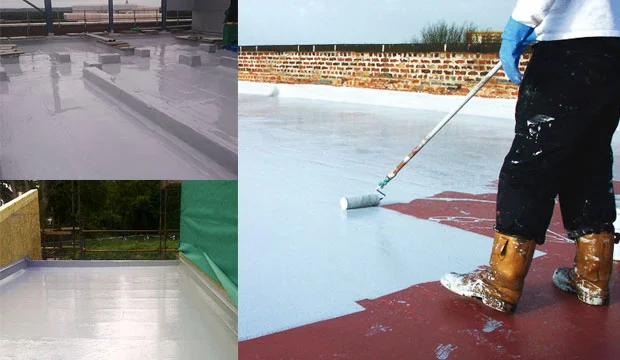Liquid Roofing is the method of making a roof impervious to water by the liquid roof coating application. It is compatible with all sorts of roof, including flat, pitched, and domed.
The concept of liquid roofing has come from the early 1800s, then a combination of natural bitumen with jute, straw, rag felt and other manually made components used for roofing solutions. Gradually the concept of liquid roofing is being upgraded with the flow of time and technology.
Different types of liquid roofing
- Polymer Modified Bitumen Emulsions and Solutions
- Glass Reinforced Resilient Unsaturated Polyester Resins
- Flexible Unsaturated Polyester Resins
- Hot Applied Polymer Modified Bitumen
- Polyurethanes
- Polyurea Systems
- Bitumen Emulsions and Solutions
- Water Dispersible Polymers
- Methacrylates
- Acrylic Roof Coating Systems (Solvent Based)
- Thermoplastic Block Copolymers (S-EB-S),(S-EP-S)(Solvent Based)
Advantages of liquid roofing:
Less-expensive
The method of liquid roofing are the fastest growing sector of the flat roofing market. Liquid waterproofing systems deliver cost effective solutions for making new or existent roofs waterproof. During the correct installation and maintenance, they can provide a long term life every now and then in excess of 25 years, and may offer savings of up to 70% on roof replacement costs.
Excellent Performance
For liquid roofing, high performance components are very essential. Prior to the engagement of the components in liquid roofing they are verified by roofing experts. It is not be able for use until the materials gets approval from the roofing specialist. There is a leading testing and approval house situated in the United Kingdom called British Board of Agrément (BBA), experts of BBA has been issuing materials approvals for liquid roofing since 1975.
Easy Application
Liquid roofing concept is so easy to perform even in winter.
Excellent adhesion to all kinds of surfaces and chemical resistant.
It can resist extreme temperatures (between-40 °C and + 80 °C ).
The membrane used in this concept is completely waterproof and no heat or special equipments are necessary .
Safety
This liquid coating system can provide a high quality safety from any kind of fire risk as the coating material used in the liquid roofing process is applied cold.
Source : www.barbourproductsearch.info

